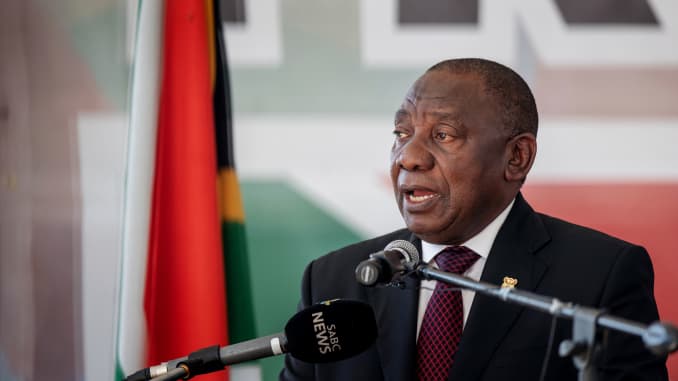KEY POINTS
- The move to prohibit alcohol comes just three weeks after an initial three-month ban, implemented to curb emergency room admissions and domestic violence, was lifted.
- In an address to the nation Sunday, President Cyril Ramaphosa also announced that masks are now mandatory in public, as the number of confirmed cases in the country exceeded 276,000.

South Africa has reintroduced a ban on alcohol sales and imposed a nighttime curfew as it looks to curtail a rapid surge in new coronavirus cases.
In an address to the nation Sunday, President Cyril Ramaphosa also announced that masks are now mandatory in public, as the number of confirmed cases in the country exceeded 276,000. The curfew will be in effect between 9pm and 4am local time from Monday, with a national state of emergency extended until August 15.
The move to prohibit alcohol comes just three weeks after an initial three-month ban, implemented to curb emergency room admissions and domestic violence, was lifted.
“There is now clear evidence that the resumption of alcohol sales has resulted in substantial pressure being put on hospitals, including trauma and ICU units, due to motor vehicle accidents, violence and related trauma,” Ramaphosa said.
He noted that the rate of infections in the country currently sits at around 12,000 per day, but also said that South Africa has one of the lowest mortality rates in the world, at around 1.5% compared to the global average of around 4.4%. At least 4,079 South Africans have died as a result of the coronavirus since the pandemic arrived in the country in March.
The government has made an additional 28,000 hospital beds available for Covid-19 patients, but Ramaphosa emphasized that the country still faces a “serious shortage of more than 12,000 health workers, mostly nurses, doctors and physiotherapists.”
“The coronavirus storm is far fiercer and more destructive than any we have known before,” Ramaphosa said. “It is stretching our resources and our resolve to their limits.”
While commending much of the national effort, Ramaphosa lambasted portions of the population who have been attending mass gatherings such as parties, funerals or visiting family without face coverings.
“Scientists and other scenario planners have presented us with models that project that South Africa may have between 40,000 and 50,000 deaths before the end of this year,” he said.
“We must make it our single most important task to prove these projections wrong.”
Some of the restrictions in place during the lockdown period in the country have continued to be eased, however. Parks are now open for exercise but not gatherings, while auctions will now be permitted. Local taxis will be able to operate at 100% capacity, with long distance taxis capped at 70% capacity, providing mask and sanitizing protocols are upheld. Family visits are still prohibited for now.

